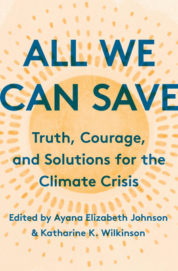 Edited by Ayana Elizabeth Johnson and Katharine K. Wilkinson
Edited by Ayana Elizabeth Johnson and Katharine K. Wilkinson
One World ($29)
by S. Leite
In August 2021, the Intergovernmental Panel on Climate Change released a report warning of runaway global warming if swift action is not taken to mitigate climate change. Called a “Code Red for Humanity” by UN Secretary General António Guterres, the report specifies the need to reach net zero emissions by 2050. For those who have begun to feel jaded by the constant stream of such news, a term was coined by the Bureau of Linguistical Reality in San Francisco—"brokenrecordrecordbreaking”—which gives a name to “the feeling of déjà vu experienced when reading that this year’s catastrophe records are, again, the highest ever.”
The Bureau of Linguistical Reality is just one of the organizations and individuals featured in All We Can Save: Truth, Courage, and Solutions for the Climate Crisis, a book co-edited by marine biologist Ayana Elizabeth Johnson and climate strategist Katharine K. Wilkinson. This book helps readers understand who is working to disrupt our fossil-fueled world, and unsurprisingly it’s women—many of them BIPOC—leading the way. All We Can Save groups a wide range of essays, poetry, and artwork into eight solutions-oriented sections: Root, Advocate, Reframe, Reshape, Persist, Feel, Nourish, and Rise. In addition to organizing the book around themes, the editors have annotated the text, drawing attention to important terms, insights, and statistics. For those new to climate activism, these notations can equip readers with a foundational understanding of climate-related issues and provide an entry point to the conversation; for those who are already active players, the annotations act as quick references that can be used to engage different stakeholders.
Together, the collection of voices serves its intended purpose as “a balm and a guide for the immense emotional complexity of knowing and holding what has been done to the world, while bolstering our resolve never to give up on one another or our collective future.” The women working on the frontlines of climate change remind us that we cannot rely solely on scientists and technology to “fix” the climate crisis. As Rhiana Gunn-Wright, one author of the Green New Deal resolution, points out, “Science can help us to understand the extent of the climate crisis, identify its causes, and measure its severity. It can even suggest time lines for action. But it cannot tell us what policy solutions to pursue. It cannot tell us what to do—not definitively.” Rather, as the introduction points out, what to do with the data is up to a “mosaic of voices—the full spectrum of ideas and insights for how we can turn things around.”
While All We Can Save features inspiring examples of success, its contributors do not shy away from highlighting the deep paradigm shift that is still needed to avoid the worst effects of climate change. Many of the authors stress the connections between environmental and social injustices, underscoring the entanglement of direct and structural violences that have been committed based “on a worldview of domination that supports an extractive economy.” The book does not offer easy solutions, stating explicitly that there is no one clear path that leads us where we need to go, but collectively, the authors of All We Can Save demonstrate that we need both a bottom-up and a top-down approach to make change. The crucial takeaway is that we cannot assume someone else is doing the work for us—the consequences of inaction are too big.
